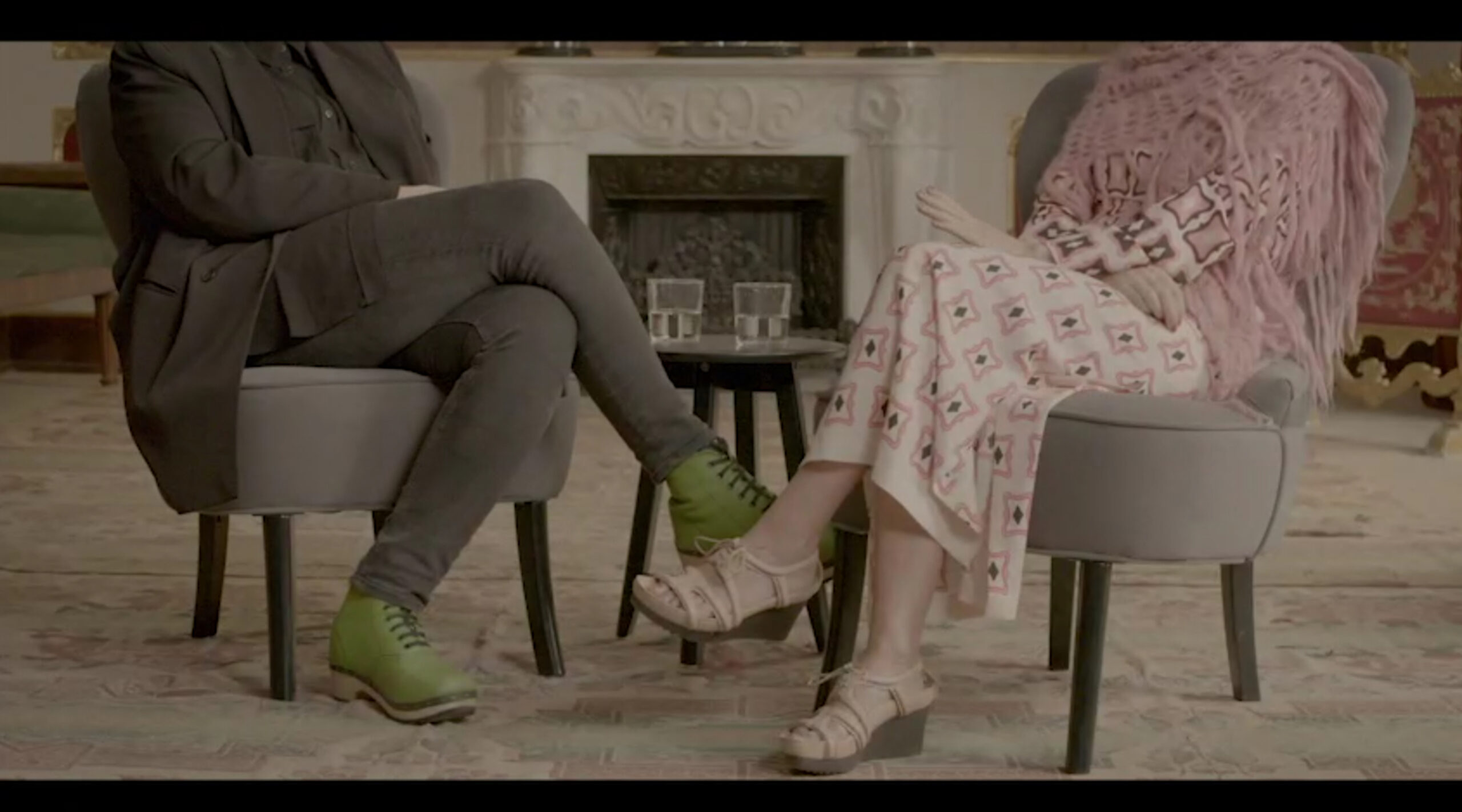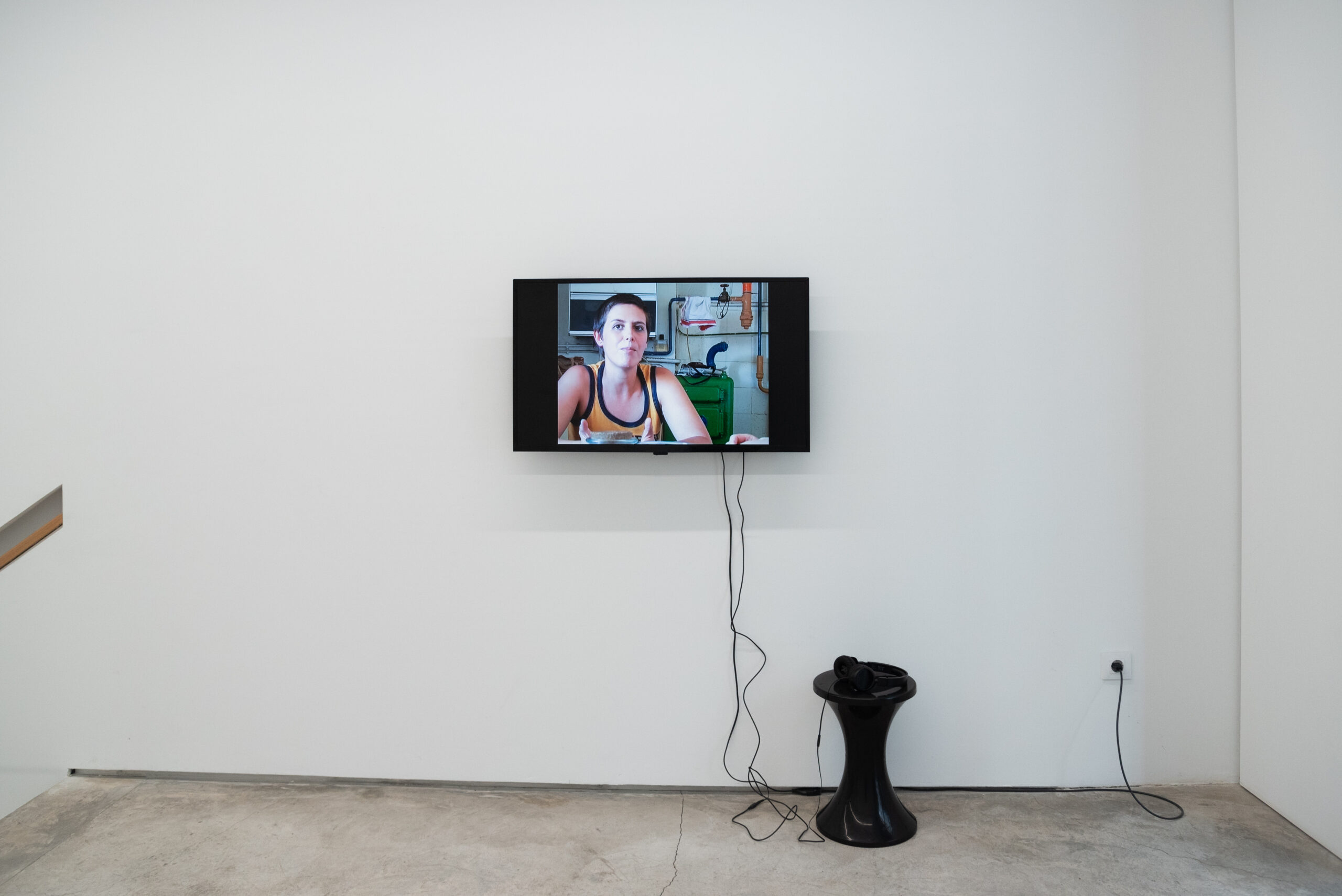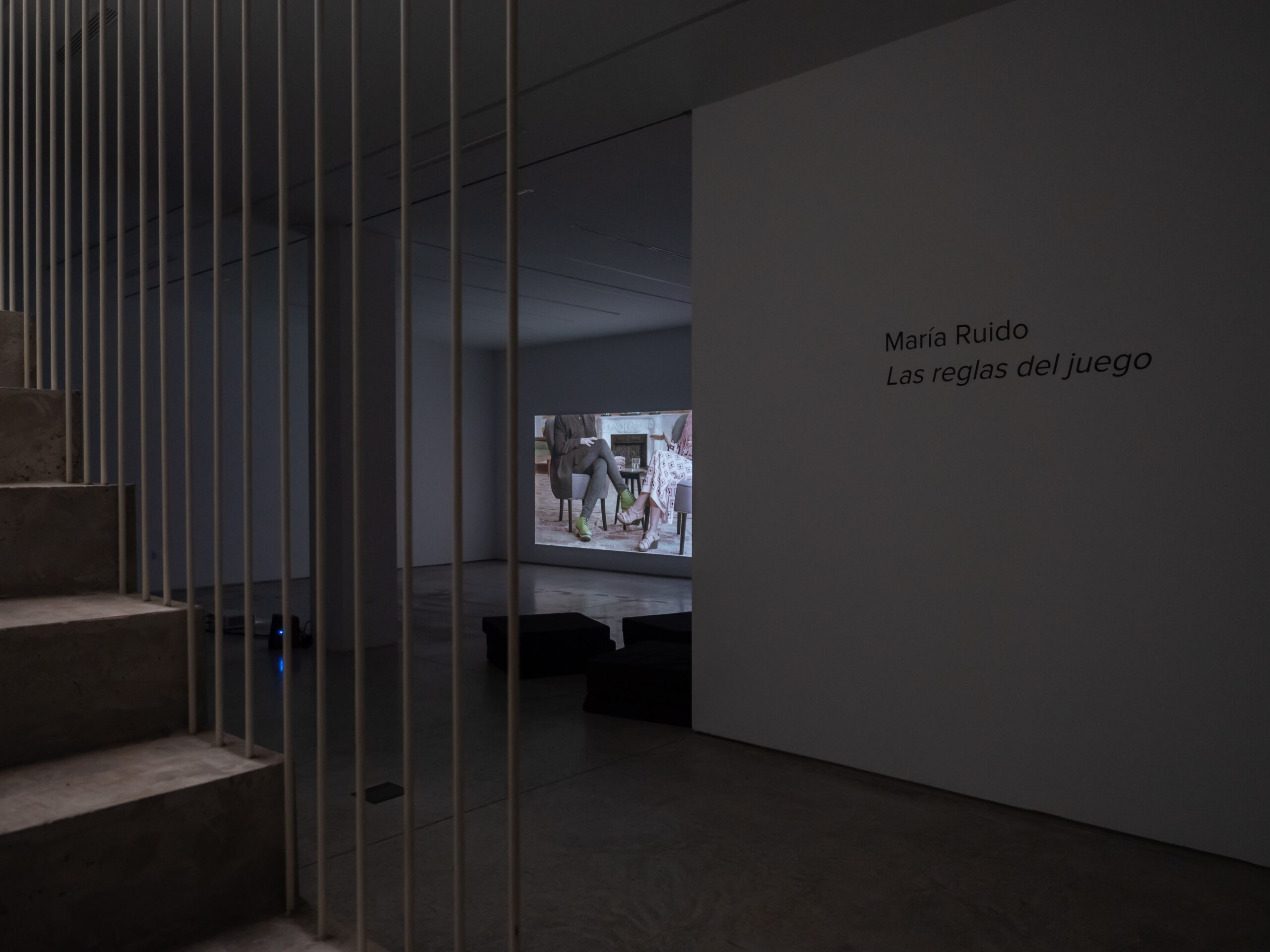
María Ruido
Fri December 16, 2022 - Fri February 17, 2023
The Rules of the Game
Notes for the swamp [Cartographies based on María Ruido] Brigitte Vasallo Avtar Brah says The word diaspora refers to a “dispersion from” and thus expresses the notion of a centre, a locus, a “home” from which the dispersion takes place. What distinguishes a diaspora from a journey are the circumstances of the departure. Not […]
Notes for the swamp [Cartographies based on María Ruido]
Brigitte Vasallo
Avtar Brah says
The word diaspora refers to a “dispersion from” and thus expresses the notion of a centre, a locus, a “home” from which the dispersion takes place. What distinguishes a diaspora from a journey are the circumstances of the departure. Not just the who, but the when, how and why. A diaspora is a process of History.
Between 1950 and 1975, six million people in the Spanish State abandoned the country life in exchange for urban capitalist modernity, transformed into unskilled labourers, foreigners, illiterates, hicks. Their locus, their home, their origin lacks geographical continuity, a demonym: they don’t come from a space but from a concept, from a way of life and a belief system that disappears with their exodus, with their migration.
The historical circumstances of this process are in- scribed within the framework of a war waged against the peasantry by the oligarchies and major landowners empowered by the Francoist military regime. Following the fall of the European fascist project at the end of World War II, the regime was left isolated from the international community; but a turn in its economic policy became the cause and con- sequence of new alliances that favoured its unusual and unexpected survival. The resultwas the overwhelming in- f lux of liberal capitalism and the extinction of communal forms of social organisation that failed to adapt or were in- compatible with the newly imposed system.
Correction: The historical circumstances of this process are inscribed, therefore, within the framework of a war waged against the peasantry by the oligarchies and major landowners empowered by the Francoist military regime and with the support and consent of the international community.
Footnote
The relationship between the forms of intergenerational violence experienced in mutant families as well as the violence of expulsion, of the transformation of bodies into proletarian bodies and of the imposition of the National Catholic sex/gender system on peasant gender forms have not yet been studied.
Interlude
[ElectroClass] Workers have been co-opted. Their decline as a class was planned: consumers, homeowners. For the first time, their sons and daughters may not have to face the same backbreaking and destructive jobs they did. The working classbecomes a place they want to leave. And why would they not want to leave it? Why should they have to try again, afterswallowing so many defeats?
If I were free, I would write
Being almost a minor during the toughest decade of the Franco regime, Delfina Vasallo left Chandrexa de Queixa, 72 kmfrom Xinzo de Limia, to go work as a servant in Paris: a language, a border and 1,410 km away from her village. I don’t thinkshe knew how to read or write, skills that she displayed years later in a hesitant, shaky way, and that she perhaps acquired in Paris.
She who eventually became my mother used to say: Madame Charmat taught me to cook and use cutlery. Frédéric Charmat, the boy who grew up under her care, was an artist. I have a painting of his in my house, the only material thing I keep of my mother’s, apart from the features of my face, which (they say) are also hers. I was born when my mother thought she wasreturning to Spain but, due to a lack of information, chose to settle in Catalonia. To a language, a non-administrative national border and 984 km from Chandrexa de Queixa. This miscalculation, this ignorance, condemned her to continue being an emigrant even after her return. To be a foreigner even when she had made the decision to stop being one.
All this banishment we carry with us is little more than that: a mistake, a miscalculation of just a few hundred kilometres.
In 1963, Dolores Ruido left Xinzo de Limia, 72 km from Chandrexa de Queixa, to go and wrap chocolates in a factory near Hamburg: a language, a border and 913 km from Paris. Her story is collected in the film The Inner Memory. MaríaRuido, her youngest daughter and director of the film, grew up in Xinzo under the care of her sisters and brothers.
When we met, Maria said to me: nós as duas somos o mesmo: ti creciches con nai mais sin terra, eu crecín con terra mais sin nai1.
Identifying with the other through a certain longing is a form of home.
What we are not, says Marlene Wayar, defines us as much as what we are.
And Mayte Martín sings: the footprint’s been erased from the sand, but the pain remains, and that can’t be erased.
Country life is the phantasmagorical alterity of urban modernity, the reified and dehumanised otherness, the construct created to establish an opposite, without an identity beyond its function as an antithesis. Country folk are portrayed as sub-human, as humanity in the process of be- coming humanised, without a valid political voice or recognised agency. Country life isportrayed as undesirable, and
- “We’re both the same: you grew up with a mother but without a homeland, I grew up with a homeland but without amother.”
there’s only room for a narrative of self-hatred, of rejection and of being grateful for overcoming that state.
The forms of thought and transmission typical of this context are resignified and ridiculed: speech becomes an accent and orality becomes illiteracy. The only valid procedure is that of the bourgeoisie: gender norms, the refinement of the body, ofgestures, the way of dressing, walking, aspirations, dreams, the way to fuck and with whom you should or shouldn’t, words, the tone of words, topics that are valid and those that are taboo.
(The bourgeoisie, by definition, don’t talk about money, sex or death)
The country, the rural, is a problem to be solved by the logics of urban modernity, enlightened, as a higher form of life. The poverty of that specific field is understood as “the poverty of the country”, an essential quality of peasant life and not an accident related to industrial capitalism, the lack of access to mechanised means of production and the eco- nomic macro-processes that make autonomous forms of subsistence impossible, unless they are marginal.
Both spheres, urban modernity and country life, are constructed as exclusive. And that same construction process makes them de facto exclusive. All that which we call culture becomes urban heritage. And ends up in the hands of the dominant classes in and of the urban, who create their own norms of access and belonging. They control the means of production of culture.Workers, when they come to produce culture and not only to consume it, do so based on the logic of alienation.
Avtar Brah says
In diasporas, the circumstances of arrival are as important as those of departure. What I refer to—she says—as “diaspora space” encompasses the diasporic community and the non-displaced communities, the relationships that are established between them, as well as the relationships that are established between different diasporas.
Regardless of the place we ended up in, I call this expulsion from the countryside under the Franco regime the Txarnego diaspora. I call it this to give it a name that’s grotesque, to give it a name that sounds bad, to give it a name that doesn’t hide the violence, that doesn’t bow its head, that embarrass- es the master (for once): may his head hang in shame every time I pronounce it. What I call the Txarnego diaspora stems from a place that is ontological. Dispersion transforms us into a polycephalic monster with unequal heads: what we are and what we aren’t in our arrivals to Catalonia, Madrid or the Basque Country, Germany, France or the United Kingdom, Argentina, Mexico or Brazil.
In the “diaspora space”, to complete the map, the cartography—to continue with the nomenclature proposed by Brah—we must also include the populations that stayed in our places of origin, bearing the emptiness of our absence.
Interlude
[The Inner Memory] Today, when I got home, I felt like a foreigner; I’m already a foreigner, as a condition, as a debt.
Avtar Brah says
The concept of diaspora places the discourse of home and dispersion in creative tension, inscribes a desire for a home whilecriticising discourses that speak of fixed origins.
The diasporic fact tests the diaspora’s journey and over- whelms the generation in transit. Us daughters of the diaspora continue to move towards the aspired being, towards the promise, towards the future that was imagined the moment we left our original world behind. If our community was broken up in order to progress, we must progress, because the sacrifice has been enormous. The board is laid out and all we have left is to play.
The imagined being is someone who has left their subordinate status behind.
What is the opposite of subordination?
What I refer to as the memory of hunger is a legacy as present and as tangible as the legacy of an illustrious surname. Theshame attached to the memory of hunger is as consequential as the pride of the (speculative) accumulation of symbolic capital. We pay the debt we carry with social mobility, that’s our condition: the obligation to continue the path that leads usaway from being subordinate.
The ruling classes don’t know they are dominant. They know.
The ruling classes don’t know that their dominant status operates in all gestures, in all relationships, at every moment. It’s not due to a lack of information: they don’t know because they simply don’t care. They don’t know be- cause not knowing is part and parcel of domination. There’s a neutrality similar to that of manhood and whiteness. There’s a transparency, a silence. Thatwhich isn’t named is that which exists the most, seeing as it doesn’t even need to be named. To enter the space of the ruling classes, their physical space, the space they’ve created for themselves, for their own class validation and reproduction—the museum, the academy, the literary cocktail party or literary encounters in general—entering that space is an exercise in the dissimulation of oneself and the dissimulation of that space’s violence. Every surname is an insult. The last names of the persecutors who greet you as if they were your equals knowing well that they aren’t, and they brand the deep imbalance withfire, with that pantomime. Because I, to be an equal, can’t be me. And they, to be equal to me, would have to cease to exist.
If I were free, I would write
There are squats that are full of daddy’s girls and boys, who hate daddy and want to stand up to him. The bourgeoisie is sofucking self-referential and takes over all spaces. To access theirs you have to disguise yourself; to inhabit the resistanceyou have to pretend you don’t recognise them when they dress up as you. Bite the bullet. Hide what you know and what you see. Make yourself docile.
Smiling is a disturbing form of subalternity.
There are squats that are full of daddy’s girls and boys, who hate daddy and can’t stand spelling mistakes.
These squatters smell different. It’s not a smell: it’s an intuition, a sound, ways that endure, that are felt in the way of entering aroom, of sitting down or getting up from a table, of taking the floor or letting it go, of looking or not looking.
The opposite of subordination is that smell. To abandon the subalternate condition is to notice that smell, de- spite the dissimulation. It’s hating that smell. The ruling classes pretend in squats as I pretend in the museum, but their lie is applaudedand mine is humiliating. It’s the continuation of a historical humiliation.
That’s the logic of subalternity, and its opposite is illegal.
I discovered that stench of authority in the gestures of the woman who owned the house where my mother cleaned, in the bankemployee who got annoyed because my father didn’t know how to read, in the teacher who was displeased by my accent mycadence my clothes my ways the tone of my voice or the volume of it. My roughness that still drags the earth under its nails. And that silence that descends when you walk into a work meeting where you’re the only one who wasn’t at the christening at the graduation party at that dinner that secret meeting between lefties who meet in secret places to talk about secret leftist things.
And on top of that, sporting those looks, that make-believe peasant body, those cheap clothes.
And that shitty last name.
But the silence betrays you. No matter how much you stop showering, you smell fucking clean.
Interlude
[Amphibian Fictions] I can’t find a better image than that of an amphibian to define the adaptation of workers to
changes in the production system. Nothing’s more similar to a woman who traverses through her long day between salaried work and invisible work than the different forms of amphibian breathing and, in the best of cases, cold blood.
Alba Solà Garcia says
We can understand the expansion of European capitalism within its own borders as a process of colonisation, tracing thehistory of domination and subalternisation of an otherness that includes the communal peasantry. Thus, Europeancapitalism, from its beginnings to the present, has carried out the domination, annihilation and erasure of identities, cultures and other forms of life; that is, different forms of production and reproduction, to establish a single system of expropriation and thought.
If I were free, I would conclude
The social ways of the ruling classes are incompatible with life.
I’d feel sorry for you if you didn’t disgust me so much. I bought a flat to be free instead of lying.
I bought a flat far enough away and run down enough for it to be cheap. I bought it in cash, with money that I’d been stashing in a box for years.
I don’t hide the money from the crooks, I hide it from the master. The crooks don’t look at me: once they see me, they stop looking. But for the master, I’m anyone: and that’s why.
For years I’ve been skimping on social life, on trips, on holidays, refusing to work jobs that disgust me, refusing to buy new clothes beyond what’s strictly necessary for carrying out the necessary dissimulation, eating things I like and that do me good, by going to therapy so as not to take medication. This is how I filled the box: by emptying.
The opposite of capitalism isn’t anti-capitalism, it’s having a roof over your head.
My biggest fear is having to sleep on the street.
My biggest fear is that my son ends up homeless because of a mistake I made. Due to a miscalculation of mine. For havingbitten the hand that feeds me. For having spit in the master’s face by writing as if I were free. I’m not prettier when I’m quiet, but I sure am safer.
You’d disgust me if I wasn’t so afraid of you.









